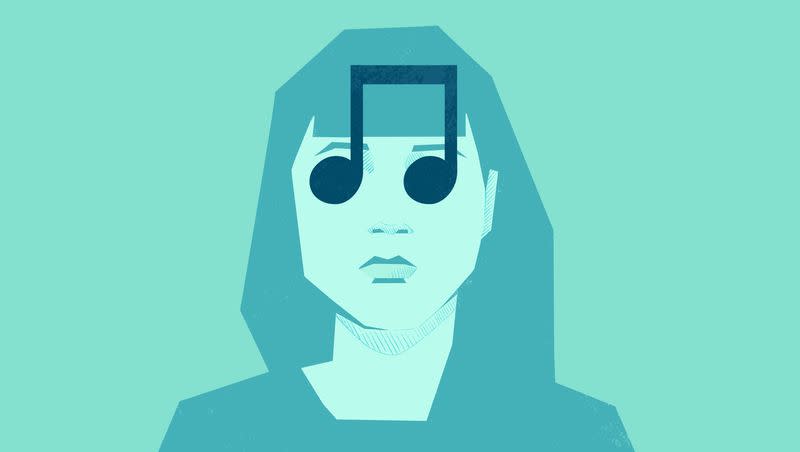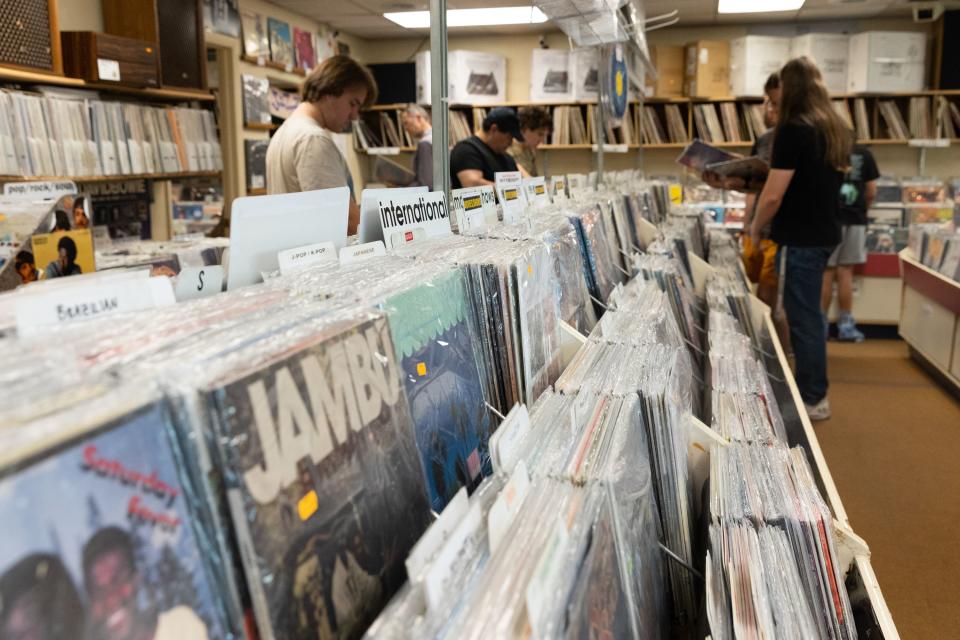Can too much music be bad for your mental health?

Utah’s oldest independent vinyl record shop, Randy’s Record Store, is sandwiched between a local cafe and a neighborhood barbershop. It doesn’t get more classic than that.
Vinyls — hanging from the ceiling, pinned to the wall, slid neatly between one another on tables — are both the decorations and the merchandise of Randy’s, along with CDs. It is a time capsule of sorts. The inside walls are neither lined with flashy strip lights and framed “art works” of abstract shapes or stripped bare to please the modern minimalist.
But records and CDs have long since stopped being the preferred method of music listening, according to CBS News. So what keeps the business going?
“I think there is something really special about having a physical copy of music; especially our favorite music,” says Sam Stinson, the owner of Randy’s Record Store. Some people keep vinyls for the memories from their youth, “keepsakes from concerts or even travel” because “we want a physical medium of things we love.”
Stinson told the Deseret News that music is powerful — capable of influencing your thoughts and feelings in any setting, whether it’s in a crowded venue singing your favorite song with a bunch of strangers or home alone listening to your favorite album.
“Everybody is drawn to wherever they’re at in life, I feel,” he said, adding that the music you listen to changes as you grow older since “certain things resonate more” at different stages of your life.
The power behind music
For many people, music feels “like something that can reflect how I feel,” Heidi Ahonen, professor of music therapy at Wilford Laurier University in Ontario, Canada, told Deseret News.
When listening to music, you can “have this feeling that I’m not the only one who is experiencing this. Somebody, maybe the composer or the songwriter, also experienced this. It’s human beings sharing something and that experience of empathy is always very healing for us when we go through difficult things,” Ahonen added.
“There is this idea that you can cry with music, and you can laugh with music. You can be angry with music, which is really important because sometimes we don’t have people around us who are empathetic to our experiences. That empathy is found in music instead,” she said.
Music helps people make sense of things, including things that are difficult, said Joshua Knobe, a professor of cognitive science at Yale University. “There’s this thing you can get from some music where you think, this is what music is really all about. This is what life is about.”
Knobe was part of a research team that recently studied why people enjoy listening to sad music. The study, published in the Journal of Aesthetic Education, discovered that the same emotions that make you feel close to others in conversation are experienced when listening to sad music.
“You feel a little bit less alone in the world. You feel connected to someone else,” Knobe said.
Physically, the body reacts to music in several ways, including with fluctuating levels of dopamine and cortisol, the chemicals in the brain responsible for feeling happy or stressed, said Mackenzie Oprean, a board-certified music therapist at the University of Utah’s Huntsman Cancer Institute.
Music affects us all emotionally, physically and mentally.
Music and mental health
Music therapy is a practice where music engagement — activities like songwriting, listening to music, singing and playing an instrument — is used to address the emotional, physical, mental or spiritual needs and goals a person may have.
“Music interventions are our vessel to address all sorts of individualized goals. We work with emotional health, physical health, motor function, cognitive disabilities,” and even “see folks through their end-of-life process,” Oprean added.

Daniel Gustavson, an assistant research professor at the Institute for Behavioral Genetics at the University of Colorado Boulder, was previously part of a team of researchers who studied the link between mental health and music engagement, their findings published in the journal Nature. “I think about music engagement in the same way I think people are using it to help themselves,” he said. “I think for the most part music listening, music and especially active music engagement is probably really good for people.”
A survey of music therapy patients at the Huntsman Cancer Institute showed that after treatment, 86% of them had improved mood, 78% felt less anxious and 77% felt less lonely.
But for the best results, music you listen to needs to match your mood. “If I’m feeling really sad,” Ahonen said, “it would almost be insulting if my friend comes in and says, ‘Oh, listen to this happy music.’ Don’t you have any idea what I’m going through?”
When you feel sad, you don’t usually seek happy things to make you feel better, Knobe said. Instead, people tend to “seek outside things that make them feel less alone in their sadness.”
Being able to express yourself through music and how you’re currently feeling is an important part of music therapy. Music’s a wonderful validator that can take away the feeling of isolation, or feeling “broken,” Oprean said.
But that can hit a limit.
“The problem starts when they (patients) keep listening to that music that evokes those tears, evokes that feeling of depression,” she added. “And that’s what (music therapists) want to watch out for.”

“Moving forward” with music
Can listening to too much music be bad for your mental health? These experts say not usually — unless you tend to wallow in negative emotions.
“Some people who listen to music to lean into their sad feelings may end up feeling worse later,” Gustavson said.
If someone has preexisting mental health issues — things like depression, anxiety or post-traumatic stress disorder — Oprean said that music could become harmful in specific settings. For these patients, music therapists will watch to see if their music use keeps them in states of distress rather than removes them from that state, especially if those patients have specific songs that are tied to traumatic events.
And some people could start using music as a form of escapism, leaving “the real world to the delight or security of a fantasy world,” according to the American Psychological Association Dictionary of Psychology.
Said Ahonen, “If somebody cannot be in silence at all and they need noise all the time,” or they use music to avoid reality, social relationships or face-to-face interactions, that’s not usually a sign of healthy music use.
Oprean warns that when folks are experiencing distress and emotional turmoil, some might use music to keep them in that state. Music should be used “to validate and then to move forward and adjust our mood,” she says, urging people to be mindful of “what we want to evoke.”
Music should instead help people stay emotionally and mentally well — and opportunities to help others feel well through music are abundant, experts say.
The Huntsman Cancer Institute music therapy program invites patients, their family members and Huntsman staff to be part of its Hope Choir, designed to bring the parties together to create music.
“It’s a really lovely way to kind of break down the hierarchy between provider and patient and provide that sense of community for patients, families and providers who are all encountering the effects of cancer on their lives. That sense of connection and community we found to be so beneficial in promoting mental health,” Oprean said.
When it comes to keeping his mental health intact, Stinson, the record store owner, said that he’s “learned to actually sit with emotions without distraction and process them in different ways.” After long hours at the record shop, he jokingly added that sometimes listening to music once he gets home is “the last thing he wants to do.”
He added, “I think music can be an escape, and it’s a beautiful escape for some people in certain situations,” but it’s important to be able to “deal with life itself,” and have music help instead of hinder that progress.


